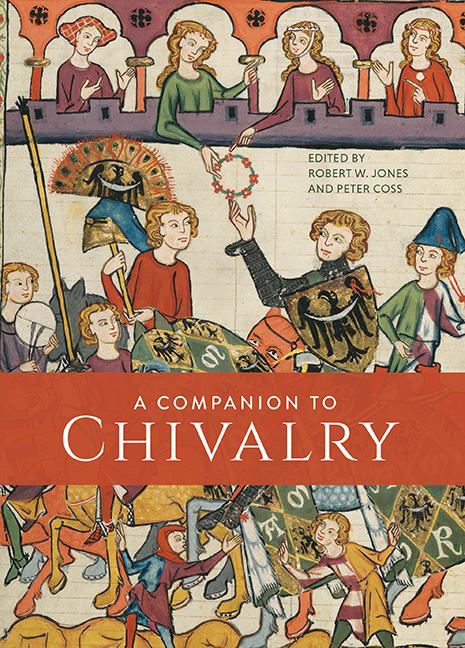Book contents
- Frontmatter
- Contents
- List of Illustrations
- List of Contributors
- Introduction
- 1 The Origins and Diffusion of Chivalry
- 2 The Organisation of Chivalric Society
- 3 The Secular Orders: Chivalry in the Service of the State
- 4 The Military Orders
- 5 Marshalling the Chivalric Elite for War
- 6 Chivalric Violence
- 7 Chivalry in the Tournament and Pas d'Armes
- 8 Heraldry and Heralds
- 9 Arms and Armour
- 10 Constructing Chivalric Landscapes: Aristocratic Spaces Between Image and Reality
- 11 Gendered Chivalry
- 12 Chivalric Literature
- 13 Manuals of Warfare and Chivalry
- 14 The End of Chivalry? Survivals and Revivals of the Tudor Age
- 15 Chivalric Medievalism
- Select Bibliography
- Acknowledgements
- Index
14 - The End of Chivalry? Survivals and Revivals of the Tudor Age
Published online by Cambridge University Press: 24 October 2019
- Frontmatter
- Contents
- List of Illustrations
- List of Contributors
- Introduction
- 1 The Origins and Diffusion of Chivalry
- 2 The Organisation of Chivalric Society
- 3 The Secular Orders: Chivalry in the Service of the State
- 4 The Military Orders
- 5 Marshalling the Chivalric Elite for War
- 6 Chivalric Violence
- 7 Chivalry in the Tournament and Pas d'Armes
- 8 Heraldry and Heralds
- 9 Arms and Armour
- 10 Constructing Chivalric Landscapes: Aristocratic Spaces Between Image and Reality
- 11 Gendered Chivalry
- 12 Chivalric Literature
- 13 Manuals of Warfare and Chivalry
- 14 The End of Chivalry? Survivals and Revivals of the Tudor Age
- 15 Chivalric Medievalism
- Select Bibliography
- Acknowledgements
- Index
Summary
They do not know what knights and chivalry mean […] The knighthood of today! Why it consists of disorderly living! What has become of the military art, so well taught by Vegetius and so many others? It no longer exists: it is the art of giving oneself up to all sorts of excesses and of leading a sottish life. (Peter of Blois, later twelfth century)
O ye knyghtes of Englond, where is the custome and usage of noble chyvalry that was used in tho dayes? What do ye now but go to the baynes [baths] and playe att dyse? And some not wel advysed use no honest and good rule ageyn all ordre of knyghthode […] Allas! what doo ye but slepe and take ease and ar al disordred fro chyvalry? (William Caxton, The Book of the Ordre of Chyvalry, c. 1484)
The knighthood nowadays, are nothing like the knighthood of old time. They rid a–horseback; ours go afoot […] They went buckled in their armour; ours muffled in their cloaks […] They were still prest to engage their honour; ours still ready to pawn their clothes. (George Chapman, Ben Jonson, John Marston, Eastward Ho, 1605)
This chapter should probably be entitled ‘The many ends of chivalry’. For centuries, writers, churchmen, soldiers, historians and moral commentators complained that chivalry and the ideals of knighthood were in decline, had been degraded to an idle or effeminate state, or were otherwise a hollow imitation of an authentic, perfected manifestation extant in the (usually unspecified) past. Witness the broad date–range of the sources quoted above. The complaint that chivalry has irretrievably declined, or indeed died, has been associated with numerous events and actual deaths from medieval and modern history, including the destruction of French knighthood at Agincourt; Richard III's death at Bosworth; the passing of Sir Philip Sidney or Elizabeth I or Prince Henry Stuart; the execution of Marie Antoinette and the end of the ancien régime; and the mechanisation of warfare in the first half of the twentieth century. Rejoinders and more nuanced considerations can be found for each claim, but the essential idea remains that chivalry's end can be temporally located. The present chapter adopts a different approach.
- Type
- Chapter
- Information
- A Companion to Chivalry , pp. 281 - 300Publisher: Boydell & BrewerPrint publication year: 2019



